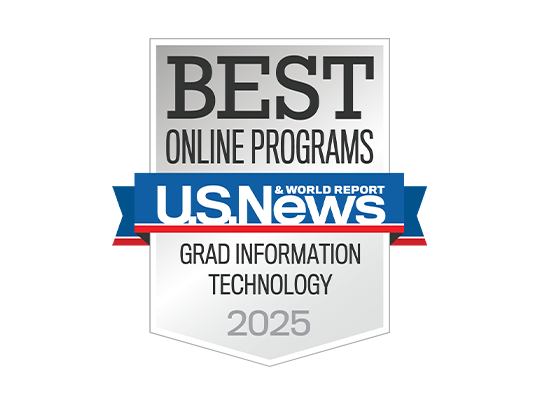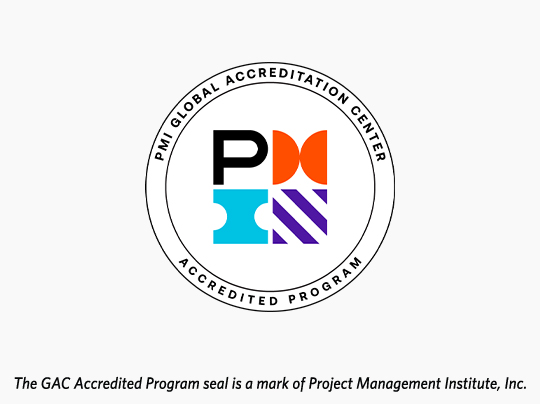Learn to Manage Complex IT Projects
Available online, on campus, and in a blended format, the Master of Science in Computer Information Systems concentration in IT Project Management at Boston University’s Metropolitan College (MET) is designed to immerse you in the fast-paced world of technological innovation—preparing you for IT leadership positions in all sectors.
Program at a Glance
- Top 10 Online Program since 2014
- Online, On Campus, and Blended
- Part-Time or Full-Time Study
- STEM Designated
- 40 Credits
- 12–20 Months to Completion
- 17 Core Faculty
- No GRE/GMAT
- Tuition & Fees—Part-Time Study*: $37,071
*Based on 2025–2026 Boston University tuition and fees. Merit scholarship may reduce cost.
Advance Your Career with a Master’s in Computer Information Systems
According to the 2017 Job Growth and Talent Gap in Project Management report from the Project Management Institute, employers will need to fill an average of 2.2 million project management-oriented jobs every year through 2027, making it an opportune time to invest in the mix of technical, leadership, and strategic and business management skills required of a project manager.
BU MET’s Computer Information Systems degree concentration in IT Project Management can provide the technical and managerial expertise to help you advance your career in this exciting area of growth. Along with an understanding of virtual project management—enabling you to manage geographically distributed software development—you will also gain valuable, marketable skills that encompass governance of large projects and programs for both predictive and various agile lifecycles. As a graduate of the MSCIS concentration in IT Project Management, you will be prepared to lead and manage agile projects—and obtain competency in roles such as scrum master or product owner.

#10, Best Online Master's in Computer Information Technology Programs
MET’s online master’s degrees in computer information technology are ranked #10 in the nation by U.S. News & World Report for 2025.
Learn More
PMI Global Accreditation Center for Project Management
BU MET’s MS in Project Management and MS in Computer Information Systems concentration in IT Project Management are accredited by the PMI Global Accreditation Center for Project Management Education Programs (GAC).
Learn More
Computer Science Career Outlook
Top computer science careers in data science, software development, and other popular areas of IT.
Learn moreWhat Is My Career Outlook as a Graduate of This Program?
1,755,537
Total number of US Jobs
240,401
Annual job openings
+5.3%
Annual job openings
6%
Projected ten-year growth in jobs
(faster than average)
$107.8K
Median annual salary
Common job titles include:
- Project Manager
- Program/Portfolio Manager
- Scrum Master
- PMO/Program Director
- Project Team Leader
- Product Owner
Employers seek expertise in:
- PM methodologies & software
- Team-building & leadership
- Decision making under uncertainty
- Agile mindset
- Sustainability-oriented, long-term thinking
- Communications, facilitation & presentation skills

“If your career aspirations are to get into IT leadership, this is the program to help you achieve that. You will build the necessary technical skills as well as business knowledge to help you advance in your career.” Read more.
Jason Wong (MET'21)
EHR Portfolio Manager, Boston Medical Center
MS, Computer Information Systems; Concentration, IT Project Management
Why BU’s Computer Information Systems Degree Has Been Top 10 since 2014
- Accreditation: The master’s degree concentration in IT Project Management is accredited by the Project Management Institute Global Accreditation Center for Project Management Education Programs (GAC).
- PMI® Exam Prep: MET’s optional, complimentary Project Management Professional (PMP®) and PMI-ACP® exam preparation courses are ideal for those who seek to pursue PMP® certification. Those who already hold PMI® certifications can earn up to 45 PDUs per course.
- Active Learning Environment: BU MET’s Computer Information Systems courses ensure you get the attention you need, while introducing case studies and real-world projects that ensure you gain in-depth, practical experience with the latest technologies.
- Career Counseling: MET’s Career Development office and BU’s Center for Career Development offer a variety of job-hunting resources, including one-on-one career counseling by appointment for both online and on-campus students.
- Engaged Faculty: In BU MET’s Computer Information Systems master’s program, you benefit from working closely with highly qualified faculty and industry leaders who hold the highest academic qualifications, are certified in project management, and have years of professional expertise.
- Extensive Network: Study information systems alongside peers with solid business experience, learn from faculty who have valuable IT contacts across several sectors, and benefit from an alumni community with strong professional connections.
- STEM Designated: Eligible graduates on student visas have access to an Optional Practical Training (OPT) of 12 months and an extension for up to 24 additional months.
- 15:1 Class Ratio: Enjoy an exceptional student-to-instructor ratio, ensuring close interaction with faculty and access to support.
- Valuable Resources: Make use of Boston University’s extensive resources, including the Center for Career Development, Educational Resource Center, Fitness & Recreation Center, IT Help Centers, Mugar Memorial Library, Howard Thurman Center for Common Ground, George Sherman Union, Rafik B. Hariri Institute for Computing and Computational Science & Engineering, and many others.
- Flexible Options: Study at the pace that works for you, evenings on campus, fully online, or in the blended format that combines on-campus and online learning. Courses begin fall, spring, and summer; online courses have two starts per term.
- Track Record: Learn from the best—BU MET’s Department of Computer Science was established in 1979 and is the longest-running computer science department at BU. Over its four decades, the department has played an important role in the emergence of IT at the University and throughout the region.
- Merit Scholarships: US citizens and permanent residents are automatically considered during the application process and nominated based on eligibility. Learn more.
Master the Tools to Excel in Computer Information Systems
The IT Project Management concentration is part of BU MET’s MS in Computer Information Systems (MSCIS) degree program. BU’s industry-leading MSCIS curriculum combines in-depth technical skills and emerging technology management. Particularly valuable for those engaged in the administration of technical projects, the IT Project Management degree concentration at BU MET introduces general concepts embodied in the Project Management Institute’s Project Management Body of Knowledge (PMBOK® Guide), while immersing you in specialized techniques for software risk management, software cost estimation, and software quality management.
BU MET’s Computer Information Systems master’s degree prepares you for jobs that are seeing faster-than-average growth and excellent salaries. According to the U.S. Bureau of Labor Statistics, the median annual wage for computer and information systems managers (for instance) is more than $146,000. And with seven concentrations, the Computer Information Systems master’s encompasses several other fast-growing and well-paid segments of the IT job market, providing the foundation for work as an application analyst, data analyst, data scientist, cybersecurity analyst, IT consultant, network and computer systems administrator, computer systems analyst, database administrator, and many other integral positions in an organization.
Graduate with Expertise
In addition to the learning outcomes derived from Metropolitan College’s Computer Information Systems master’s degree program, the concentration in IT Project Management will equip you with:
- Advanced knowledge of the following project management process groups: Initiating, Planning, Executing, Monitoring and Controlling, and Closing; knowledge of agile software development practices, and planning and governance of large projects and programs.
- Proficiency in all basic project management tools and software techniques, including software architecture, project communications, risk analysis, cost estimation and budgeting, and quality control; proficiency in planning and developing a comprehensive project plan and software development life cycle.
- Competence sufficient to architect, design, and implement software systems.
Certificate-to-Degree Pathway
You can also earn the master’s in Computer Information Systems with a concentration in IT Project Management by completing the BU MET Graduate Certificate in Information Technology and the Graduate Certificate in IT Project Management, plus two additional courses: Introduction to Probability and Statistics (MET CS 546 ) and either Information Structures with Java (MET CS 520) or Information Structures with Python (MET CS 521). Students currently enrolled in a graduate certificate who are interested in transitioning into a master’s degree should contact their academic advisor to declare their interest in this pathway. A new master’s degree application is not required. Connect with a graduate admissions advisor at csadmissions@bu.edu to learn more about this option.
Master’s in Computer Information Systems Curriculum
A total of 40 credits is required.
Students who are declaring an MSCIS concentration in IT Project Management must complete the core and required concentration courses.
Core Courses
(Five courses/20 credits)
MET CS 625 Business Data Communication and Networks
MET CS 669 Database Design and Implementation for Business
MET CS 682 Information Systems Analysis and Design
MET CS 782 IT Strategy and Management
And one of the following:
MET CS 520 Information Structures with Java
MET CS 521 Information Structures with Python
Students who have completed courses on core curriculum subjects as part of their undergraduate degree program may request permission from the Department of Computer Science to replace the corresponding core courses with graduate-level computer information systems electives. Please refer to the MET CS Academic Policies Manual for further details.
IT Project Management Concentration Requirements
(Five courses/20 credits)
MET CS 546 Introduction to Probability and Statistics
MET CS 632 Information Technology Project and Product Management
MET CS 633 Software Quality, Testing, and Security Management
MET CS 634 Agile Software Development
MET CS 783 Enterprise Architecture
Computer Science Faculty
View All Faculty
Tuition & Financial Assistance
Competitive Tuition
Our part-time rates are substantially lower than those of the traditional, full-time residential programs yet provide access to the same high-quality BU education.Comprehensive Financial Assistance
Our services include scholarships, graduate loans, and payment plans.How Much Does This Program Cost?
BU MET programs offer the flexibility of part-time or full-time study, either on campus or online. Tuition, fees, and total program cost are determined by enrollment status. If you enroll in 1–2 courses (4–8 credits) in a semester, you are charged the part-time per-credit rate. If you enroll in 3–4 courses (12–16 credits) in a semester, you are charged the full-time semester rate.
MS in Computer Information Systems, IT Project Management Concentration (Online and On Campus)
| Enrollment Status | Part Time | Full Time | |
| Courses per Semester | 2 courses (8 credits) |
4 courses (16 credits) |
3 courses (12 credits) |
| Time to Degree | 5 semesters (20 months) |
3 semesters (12-16 months)*** |
4 semesters (16-20 months)*** |
| Tuition* | $567-$1,005 per credit** |
$33,935 per semester |
$34,935 per semester |
| Fees per Semester* | $75 | $501 | $501 |
| Total Degree Cost* | $37,071 | $78,987 | $110,403 |
*Based on 2025–2026 Boston University tuition & fee rates.
**Cost per credit is determined by course number (100–599 = $567/credit, 600–999 = $1,005/credit).
***Summer semester enrollment is not required for international students to maintain F-1 visa status. Enrollment in summer semester coursework will expedite completion of program and reduce total program cost.
International students seeking an F-1 visa for on-campus study must enroll full time and demonstrate availability of funds to cover the Estimated Cost of Graduate Study; those who wish to study online may enroll part-time but are not eligible for a visa. Learn more about International Student Tuition & Fees.
Questions? Please contact us to hear from an Admissions Advisor who can help you determine the best enrollment pathway. For information regarding financial aid, visit BU MET’s Financial Aid page.

Get Started
Please visit the BU MET admissions page for details on how to apply, financial assistance, tuition and fees, requirements for international students, and more.
What to Read Next: MET Computer Science & IT Knowledge Center
- Computer Science & IT Student Stories
- How Long Does a Master’s in Computer Science Take to Complete—and What is the Cost?
- Why Get a Master’s Degree in Computer Science at BU MET?
- What Do My Career Options Look Like with a Master’s in Computer Science from BU’s Metropolitan College?
- Are There Different Computer Science Graduate Programs or Specializations at BU?




















